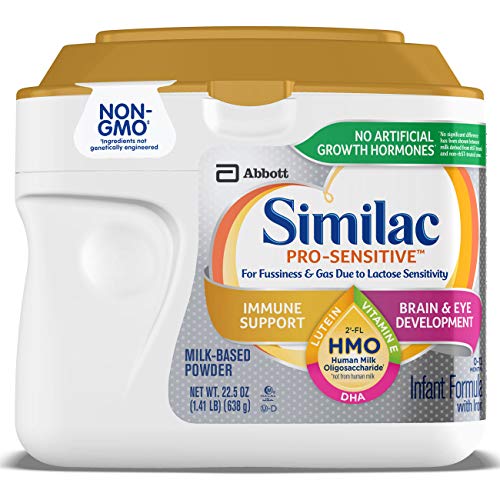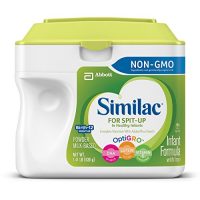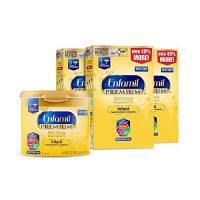EDITOR’S NOTE
As of May 2022, many formulas have become increasingly difficult to find. Please read our article, What To Do If You Can’t Find Baby Formula, for more information regarding the formula shortage.
Similac Pro-Sensitive is made for babies with lactose sensitivity without removing all dairy products. We love that the formula does not have GMOs and that it adds in an ingredient found in breastmilk.
However, as corn syrup is the first ingredient in the formula, we hesitate to recommend this formula. Keep in mind, almost every formula made for sensitive tummies uses corn syrup as one of the main ingredients, but there are other, healthier options.
We much prefer Enfamil Reguline to Similac Pro-Sensitive, as it will offer more advantages with partially hydrolyzed and whey protein which reduces the lactose that often causes problems for sensitive babies. While the recipe for Reguline still has corn syrup, it’s much lower on the list meaning it’s a building block, not the main ingredient.
Let’s take a closer look at Similac Pro Sensitive and see what advantages it offers along with the problems in greater detail.
Is Similac Pro Sensitive Right for Your Baby?
Infant formula has come a long way over the years, but breastmilk is still the best option for babies. One of the reasons breastmilk is best is the main ingredient – lactose – which is easy to breakdown and works as a stellar carbohydrate to provide energy for babies. For those who cannot breastfeed, they should look for a formula that’s the most like breastmilk to provide optimal health.
To mimic breast milk, Pro Sensitive tries to create an easy-to-digest liquid, but, unfortunately, uses corn syrup. If corn syrup has to be in formula, it should be one of the lower on the list ingredients with the focus on more nutritious options. Otherwise, Pro Sensitive provides plenty of nutrition for babies.
Iffy Ingredients
As infant formula is your child’s exclusive source of nutrients for the first six months, the ingredients matter. More importantly, how the ingredients line up matters. The main difference between the best baby formulas isn’t the designer ingredients, but how the main ingredients are distributed.
The FDA regulates what ingredients can go in a formula but require 29 specific ingredients. It’s up to the companies to decide how those ingredients are integrated into the powder.
Unfortunately, Pro-Sensitive adds not just corn syrup but also sugar mixed in with the fats. No baby formula needs this much sweetness, as the sugar can cause health issues for children.
Plenty of Carbohydrates
Carbohydrates are the first ingredient in breastmilk, which is why it makes sense to have carbs as the first ingredient in the formula. However, with breastmilk, the main carbs are lactose and oligosaccharides. The latter is a carbohydrate and prebiotic mixture.
In Pro Sensitive, the main carbohydrate is corn syrup because it’s cheap, easy to access, and babies tend to have an easier time digesting it than cow-based lactose. The oligosaccharides are lower down the chain under the fats and proteins in the form of 2′-FL HMO and act as a prebiotic in the body to fuel healthy bacteria.
Corn syrup is 100 percent glucose, while the carb in breastmilk is lactose. As sensitive babies have a harder time digesting cow lactose, companies are left with other options they can turn into powder to serve as a source of energy for babies. Enter corn syrup.
At least the formula doesn’t use maltodextrin, which can spike blood sugar. Also, no formulas use high fructose corn syrup, which is a good thing, as it’s metabolized by the liver and can cause excess fat. Glucose at least serves as the main source used directly by cells to create fuel for little bodies.
Furthermore, the problems worsen further down the ingredients list because Pro Sensitive adds sugar hidden in with the fats. The corn syrups are easily sufficient carbs for the formula and added sugar isn’t necessary.
Two Proteins
Proteins are the next main ingredient in breastmilk and should be in formula, too. Whey and casein are two forms of proteins, and they help to fuel muscle growth along with many other bodily functions. Casein is a slow-digesting protein while whey digests quickly.
Furthermore, in human breastmilk, the ratio is 60 percent whey and 40 percent casein. In cow milk, the ratio is 20 percent whey and 80 percent casein. Often, it’s casein proteins that cause babies sensitivity problems and not lactose, so it’s something to keep in mind as you can try an option with hydrolyzed protein.
In Pro-Sensitive, the main protein is milk protein isolate, which is a hydrolyzed version ready to help improve digestion. This is one of the factors we like about the formula. It essentially cuts the proteins into smaller, bite-size pieces to make digestion more feasible.
Fats from Oils
Next are fats, and those help to fuel growth, including the entire body and the brain, too. Breastmilk uses a whole list of fats including triglycerides, polyunsaturated fatty acids, DHA, AHA, linoleic acid, and more.
Formula use oils to add fats and Pro Sensitive uses a mixture of high oleic safflower oil, soy oil, and coconut oil. Babies usually do not have any issues digesting a variety of fats and the mixture used here is perfectly acceptable. Thankfully, soy oil is lower on the list as soy itself has some health concerns.
Keep in mind, this formula does not have palm oil which can reduce the absorption of calcium among other problems. Coconut oil is a fantastic option as it’s a medium-chain triglyceride that is easy to digest and helps to nourish babies. Also, Pro-Sensitive boasts 1,000 mg of linoleic acid which is an omega-6 fatty acid that helps with immunity, heart, skin, brain, and bone health.
Vitamins & Minerals
The FDA regulates vitamins, and Similac Pro-Sensitive doesn’t disappoint in this department. Your baby will get all of the vitamins and minerals they need, including calcium, iron, magnesium, and many, many more. All of the amounts are very similar to most other formulas.
Ages & Styles
Similac Pro-Sensitive is ready to use for babies ages zero to 12 months old. If your baby is a preemie, you may want to try a specialized preemie formula. It comes in two different styles, either powder you mix with water or in a ready to feed style that costs more.
Important Benefits of Pro Sensitive Formula
Designer Ingredient: 2′-FL HMO
The special ingredients in Similac Pro-Sensitive are 2′-FL HMO, DHA, ARA, Lutein, and Vitamin E.
With the 2′-FL HMO, babies get prebiotics that feeds healthy bacteria and fuels the immune system. It’s also found in breastmilk, which is why we love seeing this ingredient in baby formula.
DHA and ARA are fatty acids that increase eye, brain, and body signals in the body. DHA is an omega-3, and ARA is an omega-6 fatty acid. Both are found in breastmilk, too. However, there is a concern about the hexane extraction method with these designer ingredients.
Lutein is another ingredient uses to improve eye health and vitamin E does as well along with helping hair, skin, and the heart. Overall, Pro-Sensitive does an excellent job of adding helpful, special ingredients ready to assist babies in a healthy life.
Non-GMO Ingredients
GMO stands for genetically modified organisms, which means basically someone played Frankenstein with veggies and turned them into something different than natural foods. Now guess which foods are most likely to be GMO. The answer: corn and soy, both of which are in Pro-Sensitive infant formula.
GMOs have been linked to antibiotic resistance, cancer, allergic reactions, toxicity, and loss of nutrition. That’s right, the foods changed into franken-veggies are not only potentially very dangerous, but come with fewer vitamins and nutrients, too.
If you don’t want to dole out extra cash for organic formula or find that to be a necessity, at least try to find a non-GMO baby formula for your baby. Also, the formula guarantees your baby won’t deal with any artificial growth hormones, either.
Concerns About Pro Sensitive Formula
Contains Corn Syrup!
Nutritionists have touted the evils of corn syrup for years, so why it’s in formula is still a mystery, as there has to be a better option. Lactose helps babies to absorb calcium and feeds good bacteria, which corn syrup cannot do. At least the product is non-GMO meaning hopefully the corn isn’t either.
The scariest issue about corn syrup is the sheer sweetness. With just two bottles of Similac Pro-Sensitive, your baby is getting more sugar than a bottle of soda. We all know sweets lead to diabetes, obesity, and other health issues.
Too Much Added Sugar
If the corn syrup isn’t bad enough, you will find extra sugar mixed into the label between the oils used for fat. The average woman should only get about 6 teaspoons of sugar a day and a man can have up to 9 teaspoons. It’s obvious that a baby needs far less sugar than adults and yet in this formula – their only nutritional intake for the first six months, they are getting two forms of glucose multiple times a day.
Eating excessive amounts of sugar is linked to unhealthy weight gain, obesity, heart disease, and even type 2 diabetes. Save the sugar for when your baby is ready to eat fruit, as fructose is far healthier than glucose (in small amounts).
Conveniently, Similac does not put a daily value of their sugar or an amount of sugar in grams on their formula label, which will leave parents guessing how much sugar their baby is digesting daily over the course of multiple bottles.
Causes Gassiness and Fussiness
The biggest complaint about the formula is that many babies still experience gas and fussiness even after several bottles.
If this is a problem with your baby, then we suggest you try the Enfamil Reguline, which has a decent set of ingredients (and lower corn syrup with no added sugar) with hydrolyzed non-milk as the first ingredient and has a list of prebiotics. Also, it helps to calm fussy babies with easier digestion.
Similac Pro Sensitive vs Enfamil NeuroPro Sensitive
Similac Pro Sensitive has a very similar composition to Enfamil’s NeuroPro Sensitive. Sadly, both use corn syrup as their first ingredient. They both use milk protein isolate, too.
The main differences are that Enfamil uses palm oil and it does not have added sugars.
Moreover, Enfamil’s formula uses MFGM (milk fat globule membrane) as their designer ingredient, while Similac uses 2′-FL HMO. Both are ingredients found in breastmilk, but you cannot get both in one formula.
If you are concerned about added sugars and want more cognitive development, consider Enfamil NeuroPro Sensitive. For those who don’t care about the sugars but care about the palm oil, choose Similac Pro-Sensitive.
See more Similac vs. Enfamil comparisons here at Experienced Mommy.
Similac Pro Sensitive vs. Gerber Good Start SoothePro
Gerber Good Start SoothePro formula may help with tummy troubles, but it’s not better than Similac Pro-Sensitive.
First off, the main ingredient is corn maltodextrin, which is not just a sweet carb but one that can spike blood sugar. Also, it has palm oil making it even worse of an option.
The only advantage of the Gerber SoothePro is it has both prebiotics and probiotics. It does not have the 2′-FL HMO designer ingredient found in Similac Pro-Sensitive though but also doesn’t have added sugar either.
Honestly, we suggest skipping both options.
FAQs About Similac Pro Sensitive
How do I prepare Similac baby formula?
Preparation is easy; for every two ounces of water, add a scoop of formula. Mix both ingredients together in a closed bottle. You do not need to pack the scoop, as a loose scoop of powder is sufficient.
Now the formula is ready to serve. Discard any unused formula in one hour. If you don’t want to mix powder, you can spend the extra money to get the already pre-mixed, ready-to-feed formula.
Will it take a long time to see a difference if I switch my baby to Pro-Sensitive?
If your baby had problems with regular formula and you switched to Pro-Sensitive for tummy troubles, it can take a few bottles to see a difference. Try the new formula for at least two days to see if your baby has positive changes. Talk to your doctor if the problems do not change.
How do I know if the formula is the problem?
The only way to know if a formula is causing a problem is through trial and error as each baby is different.
Before switching formulas, try fixing some external issues:
First, make sure your baby is sitting upright for feedings. Second, burp your baby more often. Third, give smaller amounts of formula at a time.
Finally, make sure the nipples on the bottle are not creating too much air, which can cause excessive gas and discomfort.
Wrapping Up Similac Pro Sensitive
The bottom line is Similac Pro-Sensitive has far too many sweeteners that are unhealthy in their formula. If your baby needs a specialty formula that’s easier to digest because of lactose, we strongly recommend you try Enfamil Reguline first. All of Similac’s sensitive formulas use sweeteners as the main ingredient, which drops them to the bottom of the list ,as babies’ health is very important.











